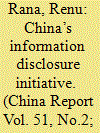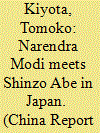| Srl | Item |
| 1 |
ID:
138092


|
|
|
|
|
| Summary/Abstract |
This article examines the initiatives taken by the government of the People’s Republic of China towards ensuring government information transparency. The Open Government Information Regulations (OGI) which was adopted in 2007 is a landmark in the transparency reforms process in China. The analysis of this initiative and further reforms becomes vital as China has witnessed newly emerged emphasis on anti-corruption campaign and rule of law. Though these regulations were adopted in 2007 at national level, many reforms have been introduced in these regulations in terms of annual guidelines from time to time. This article analyses the origin and development of OGI; the scope of these regulations; the legal, political and structural problems obstructing the successful implementation of these regulations; and further reforms towards making China more open and transparent. This work also provides a comparative analysis of information disclosure initiatives in China and India.
|
|
|
|
|
|
|
|
|
|
|
|
|
|
|
|
| 2 |
ID:
138091


|
|
|
|
|
| Summary/Abstract |
2014 marked an important year for India–Japan relations. The most important events were the victory in the Indian general elections of Gujarat Chief Minister Narendra Modi of the Bharatiya Janata Party (BJP) and his visit to Japan. Japanese Prime Minister Shinzo Abe, who is widely known as a pro-India politician, had called up Modi soon after his victory and invited him to visit Japan. This invitation was warmly accepted by Modi and resulted in his visit to Tokyo and Kyoto from 30 August to 3 September. After the summit on 1 September, Modi and Abe announced the ‘Tokyo Declaration’ which declared ‘the dawn of a new era in Japan–India relations’ (MOFA, Japan 2014a).
|
|
|
|
|
|
|
|
|
|
|
|
|
|
|
|
| 3 |
ID:
138089


|
|
|
|
|
| Summary/Abstract |
For long, the study of Japanese economic history of the prewar period has been colored by the dominant view of the modernisation economists who clearly held an anti-Marxist or a non-Marxist approach. One casualty of this approach has been the neglect of the rich micro level studies and data that are available on this period in the Japanese language. The standard view of agricultural development in Japan tends to ignore or gloss over the various struggles and difficulties the poor peasant went through. This article highlights the availability of diaries and other records left by the poor or the tenant farmers of the Meiji and Taisho periods. It shows how a study of these, along with the macro picture presented by the modernisation economists, completes the canvas and brings one closer to the realities of the prewar period. It raises questions about the image of a smooth and painless transition to modernisation that has been holding centre stage in the discourse about Japan for so long.
|
|
|
|
|
|
|
|
|
|
|
|
|
|
|
|
| 4 |
ID:
138090


|
|
|
|
|
| Summary/Abstract |
This study presents the strategic hedging framework as a way to trace the determinants of the foreign policies of hedging states. We use the case of Chinese energy security strategy in the Middle East as an illustrative case study. It first uses four criteria to establish that China’s energy security strategy in the Middle East is a strong example of strategic hedging behaviour. Then it examines the impact of oil production in the Middle East countries on the growth of Chinese economic relationships with these countries. The results of this study show clearly that oil production plays an important role in the Sino-Middle East relations. We find a positive relationship between oil production in Middle East countries, on the one hand, and the distribution and growth of China’s trade and investment with these countries, on the other hand. These results confirm that strategic hedging behaviour leads to developing China’s economic relations with the oil-producing countries in order to cover its growing needs for energy to support its economic growth. This article represents the first attempt to trace the impact of strategic hedging behaviour on the foreign policies of hedging states. Thus, it contributes to the support of the strategic hedging framework as a new theory in international relations.
|
|
|
|
|
|
|
|
|
|
|
|
|
|
|
|